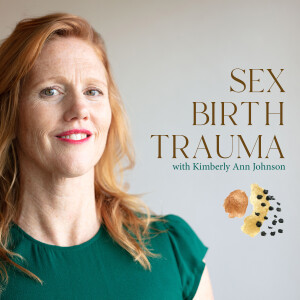
Sex Birth Trauma with Kimberly Ann Johnson
Health & Fitness:Sexuality

EP 147: Shame, Desire + Motherhood in "The Lost Daughter" with Bethany Saltman
 2022-01-18
2022-01-18
Summary
In this episode, Kimberly and Bethany discuss “The Lost Daughter” (2021) which follows Leda (Olivia Colman), a middle-aged woman on holiday in Greece as she recalls her experiences as a wife, professor, and mother. The film has received much critical and popular attention, but particularly caught the attention of Bethany Saltman, researcher of attachment, for its complex and nuanced perspective into Leda’s experience as a mother. Together, Kimberly and Bethany analyze the film from their backgrounds in attachment, somatic experiencing, and nervous system perspectives. Bethany and Kimberly discuss the film on a live Zoom call.
Bio
Bethany Saltman is a longtime researcher, writer, Zen student, and author of “Strange Situation: A Mother’s Journey into the Science of Attachment,” a book that explains the research and theories behind attachment in addition to describing Bethany’s own complex relationship with parenting. Additionally, “The Lost Daughter,” directed by Maggie Gyllenhall, is the visual adaptation of the novel written by Elena Ferrante, premiered on Netflix on December 31, 2021 with Olivia Colman, Dakota Johnson, Ed Harris, and more.
What She Shares:
–Why Bethany and Kimberly wanted to discuss the film
–How the film portrays motherhood and humanness in its complexity
–Conflict, messiness, and resisting binaries in womanhood and motherhood
–Symbolism of various aspects of the film
What You’ll Hear:
–Bethany’s background and interest in the film
–Split between staying connected to self and child
–Desire and motherhood
–How film relates to human experience
–Physicalness of motherhood portrayed in the film
–Leda and young mother’s fascination with each other
–Physical differences between younger Leda and older Leda
–Who is the lost daughter?
–Differences between fathers and mothers leaving children
–What makes us feel found versus lost?
–Why Leda takes the doll
–All characters searching to be found
–Containment of feeling found
–Pendulum between lost and found/attached and contained
–Doll as a compulsion, wish fulfillment, trying to go deep into meanness
–Crippled by shame causing a dorsal reflex
–Layering of sexuality between Leda and Nina
–Symbolism of the snake, doll, and worm
–Generational attachment is unbreakable (despite pain, trauma, etc)
–Ending of Leda being dead or alive
–What makes Leda “alive, actually”
–Daughter calling Leda after bad haircut demonstrates attachment
–Resisting cultural urge to label Leda as good/bad
–Village-mindedness versus isolated parenting
–Trauma within the film, flashbacks within films as constricting
–Trauma as a catch-all for stress, meaningful experiences, etc.
–Puritanical demand for everything to be good and if not it is traumatic/wrong
–Leaving space for messiness, complexity, contradictions, and ambivalence in human experience
–Leda not as a traumatized human, just as a human
–Trauma narrative has become another cliche or attempt to understand difficulty and complexity
–Assumptions of lack of resilience in cultural understandings
Resources
Website: bethanysaltman.com
IG: @bethany_saltman
More Episodes
 2022-04-29
2022-04-29
 2022-04-28
2022-04-28
 2022-03-04
2022-03-04
 2021-10-14
2021-10-14
Create your
podcast in
minutes
- Full-featured podcast site
- Unlimited storage and bandwidth
- Comprehensive podcast stats
- Distribute to Apple Podcasts, Spotify, and more
- Make money with your podcast
It is Free
- Privacy Policy
- Cookie Policy
- Terms of Use
- Consent Preferences
- Copyright © 2015-2024 Podbean.com




